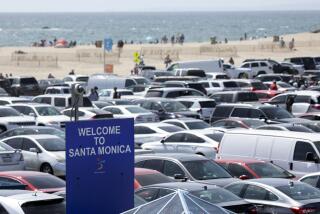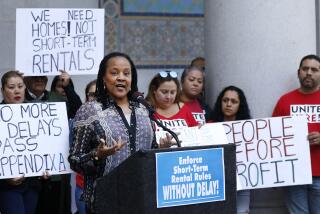Parking Permit Costs
- Share via
Have you heard? Glendale has proposed a poor tax that will cost hundreds of dollars per family and potentially lives. It is the city’s proposed ordinance to eventually limit each household to only two cars. The city also proposed that a guest permit be obtained each and every time a visitor stays overnight.
The proposed permit costs would be prohibitively expensive and an unnecessary burden to anyone on a tight budget. By the city’s own calculations, a married couple living in a condo or an apartment with two high school-age kids who have a friend stay over once a month would be required to pay $399 a year for permits. Of course, as the city stresses, these fees are aimed only at recovery costs for the permit program. What a waste!
The city hopes that the fee program will drive people off the streets, believing that too many people leave their driveways and garage space vacant. The city fails to consider social gatherings, late-night plans and drunk drivers. According to the proposed ordinance, cars without permits would have to be removed by 2 a.m. Therefore, all party-goers, late-night study groups, insomniac friends, etc., would have to vacate the city by 2 a.m. Thus it is logical to assume that all residents who don’t have the foresight to know when they will have guests over late would be required to keep several costly extra permits (which the city may not even allow) on hand.
Currently, it is common practice for groups of people to utilize one nondrinking driver to ensure the safety of others. It is also prudent practice that people remain at their host’s house if they are too intoxicated to drive. By requiring permits after 2 a.m., the city forces those who have drunk too much to incur tickets and fines and possibly have their cars towed. But, unfortunately, the drunk wishing to avoid the repercussions of illegal parking will probably attempt to drive!
What are the alternatives? First, maybe the city should pick up the tab and add public parking. Better still, and more palatable for the city, it could make certain streets one-way and add more slant parking.
Another beneficial alternative would be to put the burden on the apartment owners who benefit by having too much building and not enough parking on their property; require such owners to redesign and add parking. Even though the cost would be borne by the tenant indirectly through higher rents, at least the tenant would receive some added benefit. Perhaps the city should offer tax-incentive or low-interest loans to building owners for such additions.
DAVID J. BLUMBERG, Glendale
More to Read
Sign up for Essential California
The most important California stories and recommendations in your inbox every morning.
You may occasionally receive promotional content from the Los Angeles Times.













